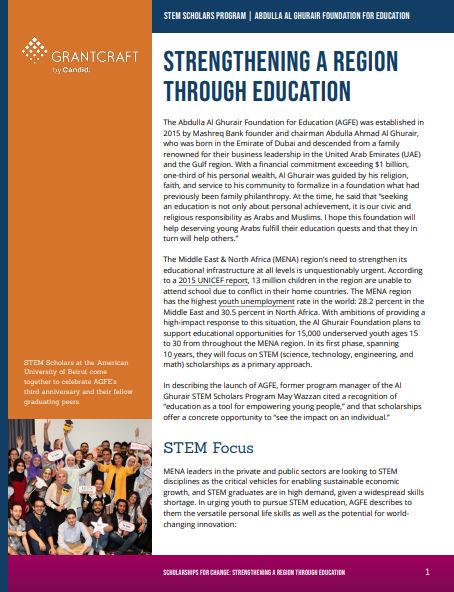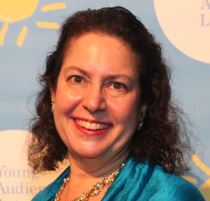Strengthening A Region Through Education
The Abdulla Al Ghurair Foundation for Education (AGFE) was established in 2015 by Mashreq Bank founder and chairman Abdulla Ahmad Al Ghurair, who was born in the Emirate of Dubai and descended from a family renowned for their business leadership in the United Arab Emirates (UAE) and the Gulf region. With a financial commitment exceeding $1 billion, one-third of his personal wealth, Al Ghurair was guided by his religion, faith, and service to his community to formalize in a foundation what had previously been family philanthropy. At the time, he said that “seeking an education is not only about personal achievement, it is our civic and religious responsibility as Arabs and Muslims. I hope this foundation will help deserving young Arabs fulfill their education quests and that they in turn will help others.”
The Middle East & North Africa (MENA) region’s need to strengthen its educational infrastructure at all levels is unquestionably urgent. According to a 2015 UNICEF report, 13 million children in the region are unable to attend school due to conflict in their home countries. The MENA region has the highest youth unemployment rate in the world: 28.2 percent in the Middle East and 30.5 percent in North Africa. With ambitions of providing a high-impact response to this situation, the Al Ghurair Foundation plans to support educational opportunities for 15,000 underserved youth ages 15 to 30 from throughout the MENA region. In its first phase, spanning 10 years, they will focus on STEM (science, technology, engineering, and math) scholarships as a primary approach.
In describing the launch of AGFE, former program manager of the Al Ghurair STEM Scholars Program May Wazzan cited a recognition of “education as a tool for empowering young people,” and that scholarships offer a concrete opportunity to “see the impact on an individual.”
STEM Focus
 MENA leaders in the private and public sectors are looking to STEM disciplines as the critical vehicles for enabling sustainable economic growth, and STEM graduates are in high demand, given a widespread skills shortage. In urging youth to pursue STEM education, AGFE describes to them the versatile personal life skills as well as the potential for world-changing innovation:
MENA leaders in the private and public sectors are looking to STEM disciplines as the critical vehicles for enabling sustainable economic growth, and STEM graduates are in high demand, given a widespread skills shortage. In urging youth to pursue STEM education, AGFE describes to them the versatile personal life skills as well as the potential for world-changing innovation:
“The world is changing, but you won’t be left behind. STEM is about basic skills that will never grow obsolete and will always be valuable. From numeracy to critical thinking, from analysis to application, you’ll be equipped with expertise that will help you every day. You’ll also get to use your talents in ways you would never imagine.”
With scholarship support from AGFE, students are pursuing degrees in STEM at the American University of Beirut (AUB) as Al Ghurair STEM Scholars. Rasha, Abdel Hameed, and Badriyeh are examples of students who recognize both what STEM offers to them not only personally, but also in service to others. In particular, they represent the kind of “master learners” the foundation aims to nourish. Their early accomplishments also demonstrate the value of STEM education as applied across several sectors. Read about them in the box on the left.
STEM Scholars
Rasha is a young Jordanian social entrepreneur who launched MindShift, a nonprofit academy with the mission of providing life skills training to Jordanian girls, when she was eighteen years old. Majoring in architecture, Rasha is determined to give back to her community through networking, entrepreneurship, and leading a life of true purpose.
Abdel Hameed is a Lebanese national studying mechanical engineering; he also has a passion for social good. Abdel Hameed invented The Virtual Eye, an electronic cane designed to help visually impaired individuals detect their surroundings and assist them in navigating independently. His life-changing invention has received a patent and has won awards at several national/regional competitions.
Badriyeh is a Palestinian who settled with her family in a Lebanese refugee camp. With her own experience of the unhealthy living conditions she encountered there, Badriyeh dreams of becoming a change agent for her community. Studying environmental science, Badriyeh hopes to tackle the most pressing health issues inside and outside the camp, especially garbage disposal and access to clean water.
Program Design
According to Wazzan, a focus on impact was present from the outset of developing the Al Ghurair STEM Scholars Program. Their initial impact framework highlighted the “big themes” of increasing access for underserved populations to high-quality education; elevating college and career readiness; improving system responsiveness to student and employer needs; promoting the development of future skills, whether within or outside formal education; and accelerating the ability of institutions to address skill gaps in the labor market.
To achieve high-impact, AGFE chose to deploy a partnership model that would provide the well-established components of high-performing college completion programs, such as creating student cohorts. Wazzan stated that their STEM Scholars receive support to cover “the hidden costs of education,” and that the scholarship add-on components AGFE has designed are often “over and above what ordinary students require so that our scholarship can be transformational for underserved youth.”
Internally, the Al Ghurair STEM Scholars Program has developed and refined a five-stage pathway for their candidates involving youth outreach, application support, a centralized online application, competitive selection, and university placement. Upon selection and entrance to one of its partner institutions, the STEM Scholars Program offers a wide range of personalized supports to ensure student success, and transition to employment. Key features of their evolving operational model, now in its third year, include:
- Surveying, evaluating and selecting potential partner universities;
- Sharing an outreach toolkit with non-government and other organizations across the region to promote the STEM Scholars Program to potential candidates;
- Applying a paperless online process of student application, award, monitoring, requests, and payments;
- Utilizing a toolkit for selection, contracting, and onboarding of Scholars;
- Having one full-time dedicated success coach/coordinator per 50 Scholars;
- Establishing a framework that lists pre-defined attributes, skill sets, and experiences around which each Scholar plans the university journey.
The STEM Scholars program is a competitive merit and needs-based scholarship for young Arab citizens who possess no other citizenship. Financial support includes university tuition, health insurance, housing support, and living/travel expenses. Additional forms of support include being part of a global network of Al Ghurair Scholars, community service opportunities, internships and employment experiences, leadership and skills development, academic advising, career counseling, and mentorship. For many applicants, their main obstacle to pursuing higher education is not financial, but rather preparedness of basic skills, such as language facility or time management.
The Al Ghurair STEM Scholars program now provides comprehensive support to undergraduate and graduate scholars who qualify for admission to 15 partner universities across MENA and abroad, including but not limited to American University of Beirut (AUB) in Lebanon; American University in Cairo in Egypt; American University of Sharjah in the UAE; Arizona State University in the U.S.; and McGill University in Canada. Jointly with AGFE, these leading institutions are working with local nonprofit organizations to identify and recruit qualifying candidates, including refugees, during and after the admissions process. The Al Ghurair STEM Scholars have also become program resources as both Scholars and alumni operate program “ambassador” offices at the country level.
Early Results
Two years into its journey, the Al Ghurair STEM Scholars program strategy has made measurable progress on three student outcomes: expanding underserved youth’s access to education, improving their college and career readiness, and increasing skills development; as well as three community outcomes: cultivating a new cadre of young leaders, empowering youth to rewrite the Arab story, and encouraging scholars to take part in regional philanthropy. To date, the program has attracted 50,000+ applicants, and awarded 600+ scholarships to students from 17 Arab states. Those selected fulfill the promise of increasing representation in higher education and voluntarism for underrepresented groups:
- 33 percent are first-generation university students
- 40 percent are female Scholars
- 17 percent are refugees or conflict-affected
- 70 percent have gained meaningful work experience
- 50+ hours of community service per year on average
 After obtaining a robust proof for their program concept, the next challenge for the Al Ghurair STEM Scholars Program to meet their ambitious STEM-centered goals is scaling their efforts using technology while supporting the individual needs of thousands of Arab youth annually. They must also provide consistent and comparable experiences for students across a diverse set of higher education institutions. At the same time, the Al Ghurair Foundation is encouraging their higher education partners to better “connect the dots” with their institutional missions, and not treat the STEM Scholars Program as a “separate effort,” but rather as a model for how universities can be more inclusive, and how foundations can do more than provide financial resources. As a result, the foundation continues to refine the expectations and terms of their partnerships and offer an “intermediate testing ground” for systems change by insisting upon institutional change.
After obtaining a robust proof for their program concept, the next challenge for the Al Ghurair STEM Scholars Program to meet their ambitious STEM-centered goals is scaling their efforts using technology while supporting the individual needs of thousands of Arab youth annually. They must also provide consistent and comparable experiences for students across a diverse set of higher education institutions. At the same time, the Al Ghurair Foundation is encouraging their higher education partners to better “connect the dots” with their institutional missions, and not treat the STEM Scholars Program as a “separate effort,” but rather as a model for how universities can be more inclusive, and how foundations can do more than provide financial resources. As a result, the foundation continues to refine the expectations and terms of their partnerships and offer an “intermediate testing ground” for systems change by insisting upon institutional change.
In reflecting on the early days of the Al Ghurair STEM Scholars Program, Wazzan posed the central question of “How do we design scholarship programs to be more transformational?” She urges other donors to start with high standards and to be unafraid of setting ambitious goals. She’s learned that we can’t always wait to have a perfect design to get started, and it is important to recognize that each context is different. Also, there is only so much we can do independently; this work requires collaboration, partnership and technology to achieve greater program effectiveness. As a result, the Al Ghurair STEM Scholars program is starting to address the immense, growing, and fast-changing talent needs of the MENA region in the early 21st century.
For more on Abdulla Al Ghurair Foundation for Education’s STEM Scholars Program visit alghurairfoundation.org/en/ content/stem-scholars.
This case study is one of 12 in a suite of case studies focused on how donors are supporting scholarships to create change. The case studies have been developed in companionship with Candid’s project Scholarships for Change, a dynamic hub that pulls together data and knowledge to tell the story of how philanthropic dollars are supporting transformative scholarships.





